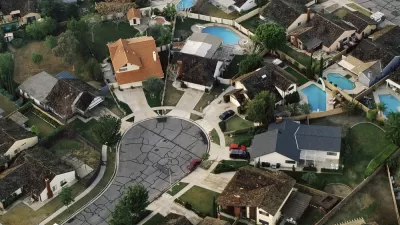Charles Marohn, known as a reformed traffic engineer that launched Strong Towns, recently debated Randall O'Toole, known as the anti-planner. Recommended for understanding the conflicts that arise on the right side of the political spectrum.
Charles Marohn provides a post-mortem on the debate he participated in with Randall O'Toole at a Plan Lafayette event after a weekend spent pondering the proceedings. Here's Marohn's diplomatic summary of his opinions about O'Toole's platforms:
"If we’re to believe O’Toole, we should privatize the local streets, utilities and other common goods and let property owners figure it out. You could probably convince me that would be a good idea on some level – particularly on the many dead end cul-de-sacs that are little more than publicly-maintained driveways – but good luck running as a local council candidate on that platform."
The question of political viability was especially relevant due to the event's focus on the ongoing effort to develop a comprehensive plan for the city Lafayette, Louisiana. Marohn noticed O'Toole's inflammatory rhetoric, which seemed to focus only on debunking the need for a comprehensive plan:
"We’re not in Portland. We’re not in San Francisco. This was Lafayette, Louisiana, a fairly conservative place in a rather conservative part of the country. These people should be working together, not living in fear that a (rather weak and broadly unimaginative) comprehensive plan will give their local leaders – people who are literally their neighbors – the power to torch their house. He knows better, and I thought his repeatedly resorting to the flaming rhetoric was a huge disservice to not just the conversation but the people of Lafayette who were listening."
The article also includes the audio of the debate, embedded in the YouTube video found below.
FULL STORY: Reflections on the Debate

Trump Administration Could Effectively End Housing Voucher Program
Federal officials are eyeing major cuts to the Section 8 program that helps millions of low-income households pay rent.

Planetizen Federal Action Tracker
A weekly monitor of how Trump’s orders and actions are impacting planners and planning in America.

Ken Jennings Launches Transit Web Series
The Jeopardy champ wants you to ride public transit.

California Invests Additional $5M in Electric School Buses
The state wants to electrify all of its school bus fleets by 2035.

Austin Launches $2M Homelessness Prevention Fund
A new grant program from the city’s Homeless Strategy Office will fund rental assistance and supportive services.

Alabama School Forestry Initiative Brings Trees to Schoolyards
Trees can improve physical and mental health for students and commnity members.
Urban Design for Planners 1: Software Tools
This six-course series explores essential urban design concepts using open source software and equips planners with the tools they need to participate fully in the urban design process.
Planning for Universal Design
Learn the tools for implementing Universal Design in planning regulations.
Ada County Highway District
Clanton & Associates, Inc.
Jessamine County Fiscal Court
Institute for Housing and Urban Development Studies (IHS)
City of Grandview
Harvard GSD Executive Education
Toledo-Lucas County Plan Commissions
Salt Lake City
NYU Wagner Graduate School of Public Service





























